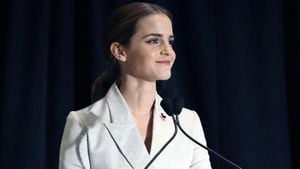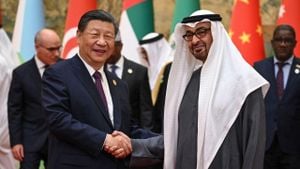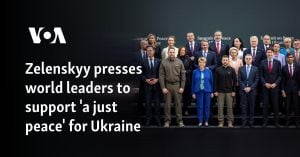After the recent federal elections, Friedrich Merz, leader of the Christian Democratic Union (CDU) and candidate for Chancellor, has initiated what many are calling the "Macht-Poker" (power poker) after his party's decisive victory. The CDU/CSU coalition emerged as the strongest force, capturing approximately 28.6% of the votes, translating to a 4.4-point increase since the last election. Meanwhile, the Social Democratic Party (SPD) faced its most significant setback, garnering only 16.4% of the vote, marking its lowest election performance to date.
Merz wasted no time reaching out to key political figures following the results, including SPD Chairman Lars Klingbeil, with whom he discussed potential coalition talks. Observers noted the significance of this interaction as it positions the SPD as Merz's primary partner for forming the next federal government, which he hopes to have established by Easter.
The election results have shifted the political dynamics significantly. Notably, the far-right Alternative for Germany (AfD) party recorded substantial gains, becoming the second-largest party, which adds pressure on Merz to negotiate effectively. The political environment suggests he must address contentious issues right away, chiefly migration policy, which he emphasized during his campaign.
According to sources, Merz has made it clear he wants to change how Germany handles migration, advocating for the immediate rejection of all undocumented migrants at the borders. This hardline stance will likely complicate coalition talks with the SPD, who view such measures as potentially unlawful and harmful to European unity. The CDU's General Secretary, Carsten Linnemann, emphasized during the campaign, "If other parties cannot agree on revised migration policies, we simply will not govern together.
Internationally, Merz's election has been welcomed with enthusiasm. Leaders such as French President Emmanuel Macron and UK Prime Minister Keir Starmer extended their congratulations, both reitering the importance of strong ties for enhancing European cooperation. Macron remarked, "We’re more determined than ever to achieve great things together for France and Germany as we work toward a strong and sovereign Europe." Starmer looked forward to building deep ties and enhancing mutual security. Such endorsement from foreign leaders reflects confidence in Merz's potential chancellorship.
The coming days will be pivotal for Merz and the CDU/CSU, as internal meetings to discuss the proposed directions for coalition talks are scheduled. Key members of the party expressed hope for Klingbeil to emerge as the ally they need from the SPD, indicating he may be the right negotiation partner to bridge the divides over migration policy. There is also concern within CDU ranks about the potential for SPD members to request base surveys concerning the coalition agreement, which could complicate matters should the party members express strong dissent.
Merz's recent history is compelling; once ousted from leadership roles under Angela Merkel, he transitioned to successful stints within the corporate sector before making his political comeback as CDU leader. His return to politics and subsequent electoral victory place him now at the forefront of potential government reform. With significant economic challenges looming, Merz signalled he understands the urgency, stating, "The world outside is not waiting for us; we cannot afford lengthy negotiations."
Looking toward the future, Merz emphasized his commitment to quick government formation. He reiterated to supporters and political allies his dedication to restoring public confidence and initiating structural reforms, particularly to stimulate economic growth and ameliorate bureaucracy. The CDU leader confirmed plans for tax reforms and efforts to tackle bureaucratic inefficiency to bolster economic prospects, which resonate with many constituents dissatisfied with the SPD’s previous administrative measures.
For many political analysts, whether Merz can successfully navigate these coalition negotiations will define his effectiveness as Chancellor. The public's perception of migration is increasingly significant, and the SPD needs to acknowledge shifting sentiments to regain lost trust among the electorate. There is also the matter of new socio-political alignments; the SDP, now under Klingbeil's leadership, must evaluate its strategies to address concerns raised during the campaign effectively.
Although the CDU has achieved the status of the leading party, it does so amid complex scenarios with historical ramifications. How Merz handles this transitional phase, including coalition negotiations, the migration strategy, and economic reforms, will unravel over the coming months. The anticipation surrounding him is palpable, as he prepares to possibly become the oldest Chancellor since Konrad Adenauer at the age of 69, underscoring the significance of this moment for both him and Germany.



